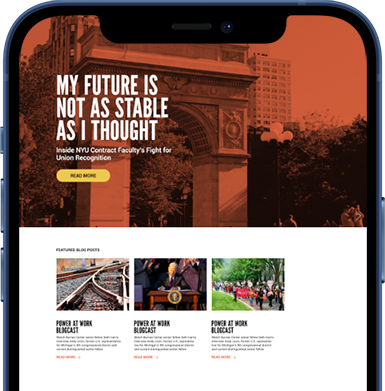As summer draws to a close, heat from a sweltering summer lingers. The gross failures of too many employers to protect their workers from this summer’s record breaking-extreme heat resulted in numerous injuries and in extreme cases, death. However, unions and the power workers build with them have provided some workers with safe havens.
One important step in the right direction is the International Brotherhood of Teamsters and their successful negotiations this summer with UPS. Numerous UPS employees suffered from illness caused by extreme heat inside delivery vans this summer. In some cases, delivery vans reached internal temperatures of up to 121℉. Conditions like this caused the collapse and eventual death of a 24-year-old UPS driver in Pasadena, California. This summer, the Teamsters took on the heat issue in their negotiations and won. The collective bargaining agreement with UPS included ensuring there will be vehicle air conditioning and cargo ventilation for UPS workers. UPS will equip all larger delivery vehicles, sprinter vans, and package cars purchased after January 1, 2024 with in-cab air conditioning. Two fans, heat exhaust shields, and air induction vents in the cargo compartments will be retrofitted into all existing vehicles.
The UPS-Teamsters agreement paves the way for other workers to be protected nationwide. Nonunion companies like Amazon should pay attention. If UPS workers can use their power both to negotiate higher wages and to ensure safer working conditions, so can other workers. An agreement like this is imperative for encouraging worker power.
Another telling story came out of Texas this summer. Data from the U.S. Bureau of Labor Statistics shows that Texas is the leading state in heat-related deaths in the workplace. BLS identified 42 deaths that have been recorded since 2011. Several local jurisdictions responded to these threats to workers by enacting local laws requiring employers to protect their workers from heat hazards. This includes a 2010 ordinance requiring that construction workers receive a 10-minute water break every four hours. The legislature responded with House Bill 2127, nicknamed the “Death Star” bill, which took effect on September 1, 2023. The bill may allow local regulations to be struck down, including those meant to protect workers from heat-related illnesses. Many Texas residents feared the worst from the bill, which targeted vulnerable populations in a state already experiencing the effects of climate change. This summer, AFSCME Local 1624 members flew from Austin, Texas to Washington, D.C. to join a thirst strike on the steps of the U.S. Capitol to protest the Death Star bill and bring attention to the issue of heat hazards. They supported Texas Representative and AFSCME member Greg Casar as he went without food or water to protest the Texas Legislature’s cruelty. Casar and his supporting AFSCME members demanded federal action to protect workers from deadly heat. The momentum AFSCME’s collective action built this summer will continue, and every indication is they will continue fighting until outdoor workers in Texas are protected from the heat.
Another notable display of worker collective action was organized by WeCount! in Miami, Florida. WeCount! is a coalition of immigrant workers and families that includes a sub-organization called ¡Que Calor! (“It’s so hot!”). On May 1st, 2022, in recognition of International Workers’ Day, ¡Que Calor! mobilized more than 200 outdoor workers to protest in Downtown Miami and demand life-saving protections — “agua, sombra, y descanso” — water, shade, and rest. This worker-led campaign for climate, health, and labor justice aims to educate outdoor workers about heat-related illness and its symptoms, their rights and protections under the law, and how to speak out for those rights and protections. Their goals can be divided into four categories: base-building, leadership development, popular education, and grassroots advocacy. A powerful tool to achieve these goals is worker collective action.
Workers’ voices are being unheard in Washington. This summer, the Biden Administration announced new precautions to keep outdoor workers safe in the heat. The Department of Labor (DOL) issued a Hazard Alert relating to heat pertinent to outdoor workers. The DOL will provide information on steps employers can take to increase protections for their employees, help educate workers on their rights and available protections against retaliation, and highlight the steps the Occupational Safety and Health Administration is taking to protect workers from heat.
These government precautions are the bare minimum to keep workers safe, but they are only the beginning of a necessary response to the demands of unions like AFSCME and grassroots organizations like WeCount! The heat is not going anywhere, and will put an increasing number of workers at risk. Courageous individual workers and unions fighting for fair and safe working conditions also are not going anywhere, and worker activism is rising right alongside the temperatures.
Subscribe to the Power at Work Blog

